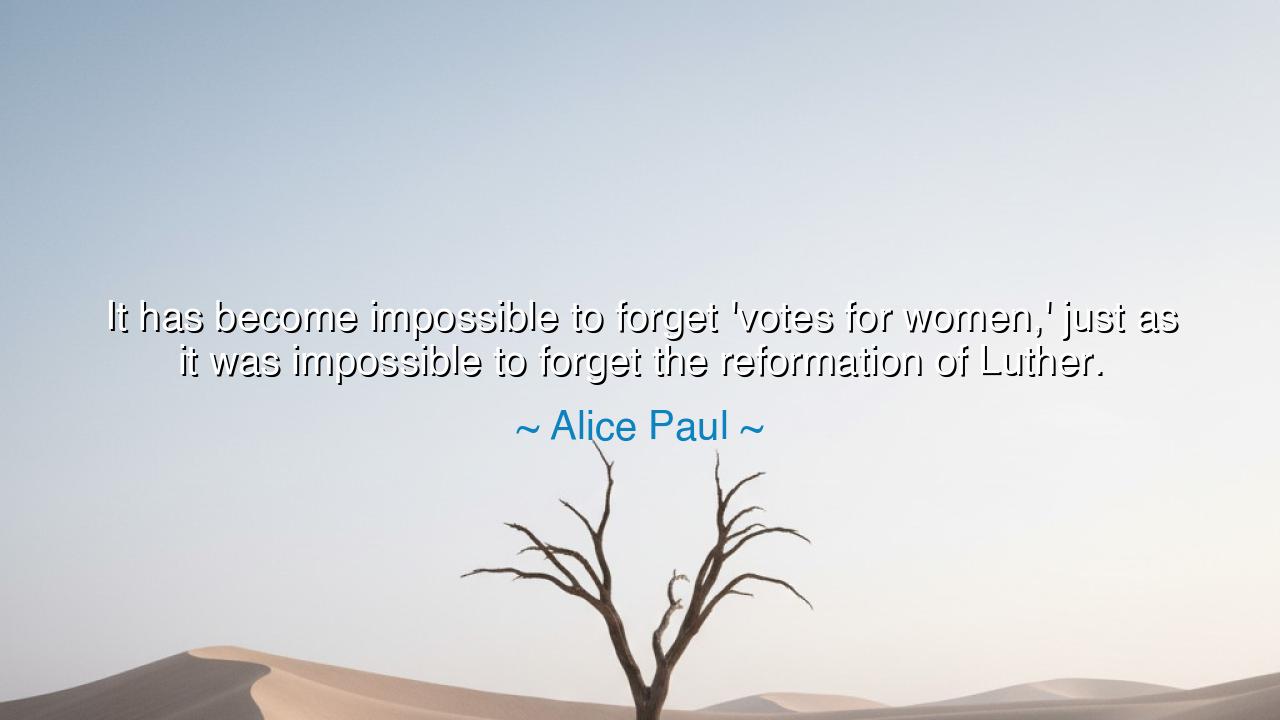
It has become impossible to forget 'votes for women,' just as it
It has become impossible to forget 'votes for women,' just as it was impossible to forget the reformation of Luther.






The words of Alice Paul — “It has become impossible to forget ‘votes for women,’ just as it was impossible to forget the reformation of Luther” — resound with the certainty of a revolution that has crossed the threshold of history. She declares that the cry for women’s suffrage was not a passing breeze but a storm, unrelenting and unforgettable, just as Luther’s challenge to the Church reshaped the very order of faith. In her voice, we hear triumph: once the seed of justice is planted in the soil of human conscience, it cannot be uprooted.
At its heart, this saying teaches that great movements of liberation are irreversible. Just as the Reformation shattered centuries of unquestioned authority and opened the path to new freedoms, so too did the demand for votes for women break through barriers of silence and oppression. Both movements began with voices dismissed as heretical or dangerous, yet they grew into roaring currents that no king, priest, or politician could contain. Once injustice is named, it lingers in the minds of all, demanding reckoning.
History proves Paul’s wisdom. In 1517, Martin Luther nailed his theses to the door at Wittenberg. His challenge to indulgences seemed at first the act of a lone monk. Yet his words ignited a fire that spread across nations, forever altering the structure of Christianity. In the same way, when women like Paul chained themselves to railings, marched in the streets, and endured prison for suffrage, they were mocked and beaten. Yet their cause became impossible to ignore, for truth once spoken cannot be silenced.
Her words also remind us of the persistence of justice. Movements such as votes for women may face years of resistance, but the idea, once alive, grows with each generation. Children hear it, mothers repeat it, and fathers begin to wonder. The rulers may attempt to bury it, but the soil only makes it bloom stronger. Like the Reformation, it ceases to be a single cry and becomes the anthem of an age.
Let future generations remember this: the cry for justice may begin as a whisper, but once it enters the soul of humanity, it cannot be forgotten. Alice Paul teaches that causes like votes for women are not fashions of a moment, but turning points of destiny, etched into memory alongside the greatest revolutions of spirit. To stand with such movements is to walk with history itself, and to know that the truth once spoken will endure beyond all opposition.






NTNgoc Tran
I love how Alice Paul ties the women's suffrage movement to something as historic as the Reformation. It makes me think about how certain causes become deeply embedded in history, never to be forgotten. But what about the other aspects of the women’s rights movement that haven’t been fully addressed yet, like wage equality or reproductive rights? Is it possible that these issues will also eventually be seen as 'impossible to forget' in the future?
AHAn Huynh
Alice Paul’s statement makes me reflect on how movements that seem so monumental in the past still echo in our culture today. The mention of 'votes for women' makes me think about the lasting impact of social justice struggles, but it also raises a question: do we truly recognize the ongoing work needed for women’s equality? While the right to vote was a huge victory, have we really achieved true gender equality, or is the struggle just evolving?
LVThi Ly Vo
Alice Paul's comparison of 'votes for women' to the Reformation is a powerful way to emphasize the profound impact of the women's suffrage movement. But I can’t help but wonder if there’s an underlying assumption that the fight for gender equality is 'finished.' Do we risk oversimplifying the issue by focusing too much on past milestones, or is this just a reminder of how hard-won progress can be, even if the struggle continues in other forms?
LKLum Kpa
I find Alice Paul’s analogy between 'votes for women' and Luther’s Reformation to be quite bold and thought-provoking. It speaks to the idea that certain historical events shape the course of society forever. However, I question whether the struggle for women’s rights is truly over, even if the vote was won. How much has actually changed for women, beyond just the vote? Is the impact of the movement still being felt in the same way today?
PTGioi Pham Thi
Alice Paul’s statement about 'votes for women' being impossible to forget is intriguing, and it really highlights the enduring power of social movements. But does this mean that the fight for gender equality is complete? If the push for women’s suffrage is remembered so strongly, what does that say about the ongoing battles women still face today? Are we still waiting for a true, lasting societal transformation on women’s rights?